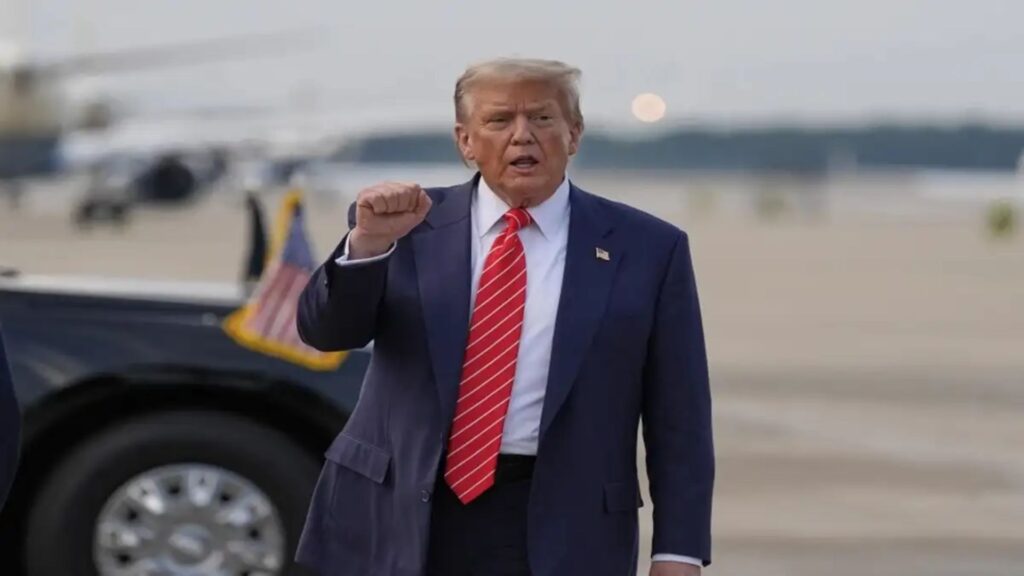In a dramatic Independence Day ceremony, U.S. President Donald Trump signed into law the controversial “Big Beautiful Bill,” a sweeping legislative package that delivers major tax breaks, deep welfare cuts, and expanded immigration enforcement. Framed as a cornerstone of Trump’s second-term agenda, the bill’s passage marks a significant political victory for the President, even as critics warn of dire consequences for working-class Americans.
The bill was signed Friday during a patriotic spectacle staged on the White House driveway, complete with fighter jet flyovers and Cabinet officials flanking Trump as he declared, “Promises made, promises kept.” The flyover, Trump said, honored the recent U.S. bombing campaign targeting Iranian nuclear sites.
“This legislation is going to turn our country into a rocket ship, economically,” Trump proclaimed during a 22-minute address, hailing the bill as a defining achievement of his presidency.
Key Provisions of the “Big Beautiful Bill”
The legislation, passed along strict party lines, reinforces and expands the 2017 Trump-era tax cuts. Its most notable provisions include:
- Elimination of taxes on tips and Social Security income
- $1.2 trillion in cuts to Medicaid and food assistance programs
- Tougher immigration enforcement and increased funding for detention
- Repeals of key Obama- and Biden-era health and environmental regulations
Supporters argue that the bill will unleash economic growth, incentivize work, and reduce government overreach. But opponents see it as a dangerous gamble that will deepen inequality and strip vital safety nets.
Narrow Passage, Strong Opposition
The bill passed the Senate by a razor-thin margin, with Vice President J.D. Vance casting the tie-breaking vote. Only two Republicans opposed the measure, including Representative Thomas Massie of Kentucky, who has since faced harsh criticism from Trump allies.
Senator Thom Tillis of North Carolina, who also resisted the legislation, announced he will not seek re-election after becoming a target of Trump’s public rebuke.
No Democrats voted for the bill. House and Senate Democrats, along with national labor leaders, condemned the law as a massive transfer of wealth from the working class to the wealthy elite.
Economic and Social Fallout
According to the nonpartisan Congressional Budget Office (CBO), the bill is expected to increase the federal deficit by $3.3 trillion over the next decade and result in nearly 12 million Americans losing health coverage.
Labor unions were among the first to issue sharp denunciations. AFL-CIO President Liz Shuler labeled the law “the worst job-killing bill in American history,” accusing the administration of sacrificing workers’ welfare for the benefit of corporations and billionaires.
“This is the biggest money grab from working people in modern American history,” Shuler said in a statement.
Democratic National Committee Chair Ken Martin added that the bill “cements the GOP as the party of billionaires and special interests, not working families.”
Trump Doubles Down
Unshaken by the backlash, Trump dismissed the criticism, attributing it to what he called “hatred” from Democrats.
“They hate Trump — but I hate them, too,” he said in a speech in Iowa on the eve of the bill’s signing. In Washington, he added, “Everybody’s going to live. Don’t believe the con job.”
He insisted the bill is “very popular,” although polling tells a more nuanced story.
Mixed Public Opinion
A recent Washington Post/Ipsos poll revealed public support for some individual provisions, such as removing taxes on tips and expanding the child tax credit. However, a majority of Americans opposed the sharp cuts to food assistance and healthcare, and 60% said they found the projected rise in the national debt “unacceptable.”
The law’s divisive nature has already set the stage for the 2026 midterm elections, with Democrats planning a full-fledged campaign to highlight the bill’s most unpopular elements through rallies, ad blitzes, and grassroots mobilization.
A High-Stakes Legislative Gamble
As fireworks faded over the National Mall, Trump’s bold legislative move left the nation deeply divided. While the “Big Beautiful Bill” fulfills several of his long-standing pledges, it also introduces new political risks that could shape the future of his presidency — and that of the Republican Party.
Whether it serves as a conservative triumph or an electoral misstep remains to be seen, but one thing is certain: the battle over the bill’s legacy is just beginning.
